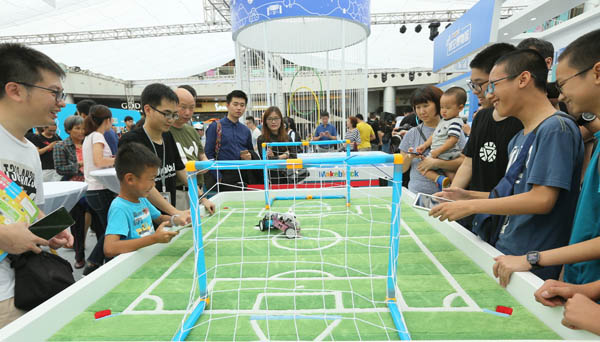 |
|
Visitors play with mBots at a carnival hosted by Makeblock in Beijing. [Photo/China Daily] |
Codemao is an education company that provides online graphical programming courses for students ages 6 to 16. It also provides an online programming platform where children can design and display their own work, such as games, music and animation.
Li Tianchi, founder of Codemao, is confident of the programming education market in China, which he believes may exceed the market for English study.
"The English-learning craze derived from the need for people-to-people exchanges in the globalized world. Nowadays, artificial intelligence is creeping into daily life," Li Tianchi says.
"Programming is the 'dialogue' for dealing with artificial intelligence.
"Students are not learning programming to become programmers when they grow up. It is going to become a basic skill for many walks of life. If a doctor requires a surgical robot or an astronomer wants to do a planetary-crash simulation experiment, they will need programming skills."
Li Tianchi is happy to find that many children who indulge in games become game designers, while children who like painting and writing incorporate their hobbies into programming.
From this year, Zhejiang province is listing information technology as an optional subject on the college entrance examination, and programming is an important part. In Beijing and Shanghai, students' programming talent may improve their chances of getting into better secondary schools.
But Li Tianchi wants students to think of programming as "interesting" instead of another cram subject.
"Programming education should focus on how to liberate the students' creativity-not on utilitarian needs."
Makeblock, a Shenzhen-based robotics company, develops programmable education robots, programmable drones and other education products with graphical programming functions.
Founded in 2013, Makeblock has gained a market share in North America, Europe, Asia and the Middle East.
Wang Jianjun, the founder and CEO of Makeblock, says its products are selling in more than 140 countries and regions across the world. One of its star products, mBot, for example, has been particularly welcomed at schools in France and Spain.
But the company is now turning its attention to the Chinese market.
"We are working with more than 1,000 public schools across China to promote programming education," says Wang Jianjun.
Many parents in China are more open-minded than previous generations, and they have more favorable attitudes toward programming and raising better-rounded children.
Wang Jianjun admits he didn't have the chance to learn programming until he was an undergraduate. But now many Chinese children have access to programming at a younger age.
"Children have a lot of creativity, and programming is a useful path to creation, helping them turn their ideas into reality," he says.